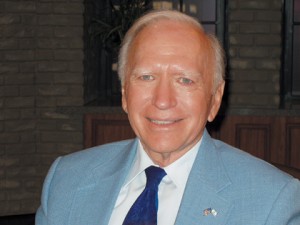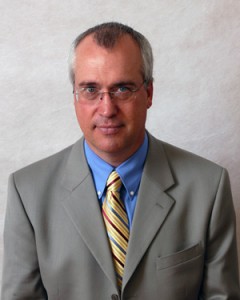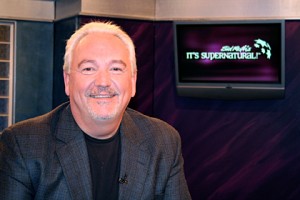Sid Roth welcomes William Morford
SID: Hello Sid Roth your investigative reporter here with William Morford, and I am so excited because he’s a Greek scholar and he has a fresh new translation of the New Testament that will make, I think, most of the others obsolete. Why do I say this? Because he explains Hebrew idioms; a Hebrew idiom is an expression at the time that Jesus walked in the flesh that you can’t take literally. If you take it literally, you’ll miss what he was saying. He also restores the Jewish roots to the New Testament. Again, culturally, if you don’t understand the culture, you will miss what Jesus is saying. But the most exciting thing as far as I’m concerned, and William Morford, I was talking to you before we went on the air, and I said as a Greek scholar that God commissioned to do a fresh translation of the New Testament; it was, I know it was a commission by God. It’s my favorite reading Bible now and I take it with me wherever I go. There were many things literally you were angry over when you saw the other translations, but I asked you what was the thing that made you the angriest?
WILLIAM: The lack of power – because the Jewish people today are still very expressive and that enthusiasm and the power carries through into the Greek. And the Greek language is a very, very expressive language.
SID: Now I know what you’re saying because I’ve read this, but I read other Bibles and somehow you have captured the power that the other translations do not have; but give me an example.
WILLIAM: All right one is at the pool when Jesus healed the paralytic who had been there 39 years. Jesus told him not to just get up and carry his pallet, but he said you must immediately get up and you must continually walk with your pallet.
SID: That makes such a difference
WILLIAM: Yes, and see you have to do it immediately; we have to receive a healing and then walk like we have it; go away like Hannah left the temple, the tabernacle, after she prayed before Samuel was born. When she left that tabernacle after talking to Eli, she knew; her countenance was different already. Ours should be different; we should carry our healing and know that we’re to keep it.
SID: You know there’s a Greek word you translate, and I don’t see it translated that way in other translations, where many times it says, you translated, you are to ‘take’ from the kingdom, from the invisible realm; whereas the words used in King James and some of these other, all these other translations, they just don’t have that action. And I took that one phrase – ‘take.’ And because see I know in the invisible realm, I can just reach my hand through to that invisible realm and pull in what I am believing God for. You know because the word of God is alive but the way that you put the action back into the language. Sickness – I have never seen this before, but in your Bible you don’t call sickness “sickness,” you call it “evil.” Why?
WILLIAM: Because the word that I translated evil is cockos and that’s the primary meaning of the word. Sickness was just because the translators didn’t know how to deal with it; they didn’t understand deliverance for instance, or that the devil is the source for sickness.
SID: And a lot of people say well God uses sickness to teach me something, to get me closer to God, but there is no evil in God.
WILLIAM: That’s right.
SID: And so when you say evil rather than sickness you call it for what it is – something evil, an intelligent being that is evil.
WILLIAM: That’s right
SID: I’m so excited about that, but then it’s like a two edged sword. You talk about the Jewish roots. How in the world did you ever get into that? You’re not Jewish.
WILLIAM: No, it was amazing; to start this I had no intention of ever publishing the translation of the Greek; and I kept practicing with Greek. I translated for years and years and years just so I wouldn’t forget the Greek that I’d learned; because it was a painful experience learning all of that.
SID: It’s difficult
WILLIAM: That’s right
SID: So why did you? No why did you learn Greek? The average person does not learn Greek
WILLIAM: I know that you have to learn the languages to really understand scripture; you have to study both Hebrew and Greek, and I just wanted to have more of God in me. I wanted to have a better understanding of who He is and of what kind of relationship He wants with me, and to do that you have to study the languages, or
SID: But you had such an eminent professor and when he read this translation of your Bible, what did he say?
WILLIAM: He took me around and introduced me to a number of people in his church and he said this is one of my students who has surpassed me.
SID: But you know I don’t believe it was a natural thing; I believe it was a destiny we have a Hebrew word: it’s bashert; it was meant to be. So you have this desire to learn Greek, you surpassed your teachers but at the same time how did you get involved in the Jewish roots because if you miss the Jewish roots you miss this book it was written by Jews for Jews in a Jewish culture? Give me a break!
WILLIAM: Okay the answer to that lies, we were then living in Lakeland Florida. That’s when the Lord told me to get serious with the translation and I knew that I had to do it; I was just driven to do it. And I had looked for a Messianic rabbi around and there was none close by, but there was one Jewish synagogue. So I called and made an appointment and talked with the rabbi in there and we ended up becoming very close friends. And that rabbi is the grandson of Eliezer Ben-Yehuda the namesake grandson.
SID: And for those who do not know who Eliezer Ben-Yahuda is, explain.
WILLIAM: He is the man, who over a hundred years ago reintroduced Hebrew as the common language of Israel.
SID: He is the modern architect of spoken Hebrew today. Don’t go away it is fantastic!








